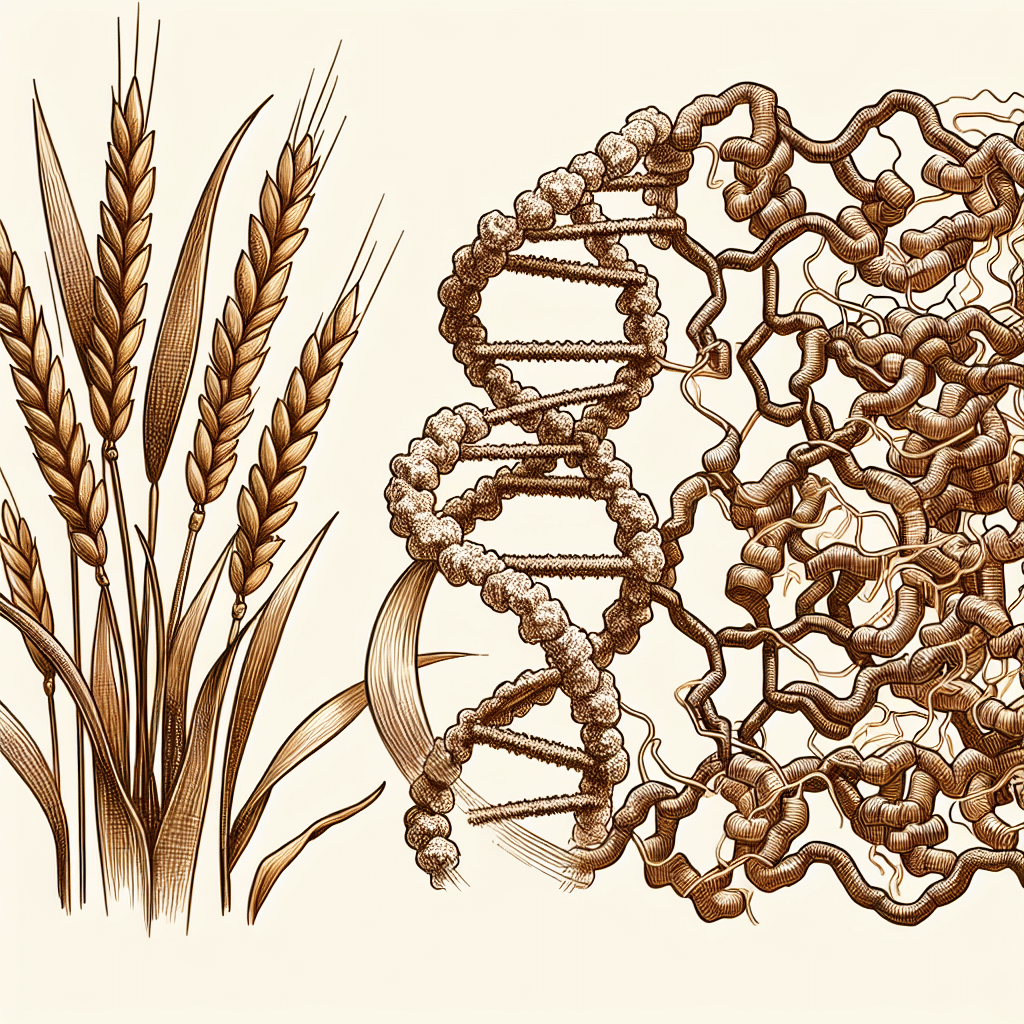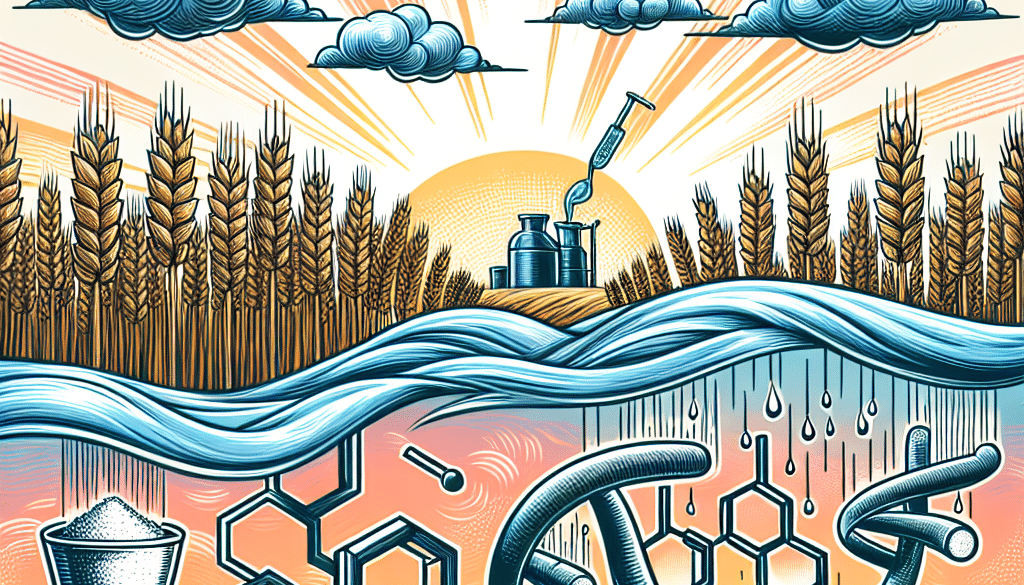What Protein Is Made Of Wheat?
-
Table of Contents
- Wheat Protein: The Plant-Based Powerhouse in Your Diet
- Understanding Wheat Protein
- Types of Wheat Protein
- Nutritional Profile of Wheat Protein
- Benefits of Wheat Protein
- Applications of Wheat Protein
- Case Studies and Statistics
- Conclusion: Embracing Wheat Protein in Your Diet
- Discover ETprotein’s Premium Wheat Protein Products
Wheat Protein: The Plant-Based Powerhouse in Your Diet

Proteins are essential macronutrients that play a critical role in building, maintaining, and repairing tissues in the body. While animal products are well-known sources of protein, plant-based proteins are gaining popularity due to dietary preferences, allergies, and environmental concerns. Wheat, a staple grain consumed worldwide, is not just a source of carbohydrates but also a significant provider of plant-based protein. In this article, we will explore the protein derived from wheat, its types, benefits, and applications.
Understanding Wheat Protein
Wheat protein, commonly referred to as wheat gluten, is a complex of proteins found in wheat grains. It is composed primarily of two types of proteins: gliadin and glutenin. These proteins are responsible for the elasticity and stretchiness of dough, making wheat particularly useful in baking. When flour is mixed with water, the gluten proteins form a sticky network that has the ability to trap air, allowing bread to rise and maintain its shape.
Types of Wheat Protein
There are several forms of wheat protein that are used in various food products:
- Vital Wheat Gluten: This is the natural protein found in wheat, extracted and dried into a powdered form. It is commonly used as a supplement in baking to enhance dough strength and elasticity.
- Wheat Protein Isolate: This is a highly refined form of wheat protein that contains a higher percentage of protein compared to vital wheat gluten. It is often used in high-protein sports nutrition products.
- Hydrolyzed Wheat Protein: This form of wheat protein has been broken down into smaller peptides, which can be more easily absorbed by the body. It is frequently found in cosmetic products and as a dietary supplement.
Nutritional Profile of Wheat Protein
Wheat protein is not only valued for its functional properties in food production but also for its nutritional benefits. It is a good source of amino acids, the building blocks of proteins. However, it should be noted that wheat protein is not a complete protein, as it is low in lysine, an essential amino acid. This means that it should be consumed with other protein sources to ensure a balanced intake of all essential amino acids.
Benefits of Wheat Protein
Wheat protein offers several health and dietary benefits:
- Supports Muscle Growth: Like other proteins, wheat protein contributes to muscle repair and growth, making it a valuable component of a fitness-focused diet.
- Increases Satiety: Protein-rich foods can help you feel full longer, which may aid in weight management.
- Plant-Based Protein Source: For vegetarians and vegans, wheat protein provides a valuable source of non-animal protein.
- Environmentally Friendly: Plant-based proteins generally have a lower environmental impact compared to animal-based proteins.
Applications of Wheat Protein
Wheat protein is versatile and can be found in a variety of products:
- Bakery Products: It is used to improve the texture and volume of bread, pastries, and other baked goods.
- Meat Substitutes: Wheat gluten is often used to create vegetarian meat alternatives, such as seitan, due to its chewy texture.
- Nutritional Supplements: Protein powders and bars may include wheat protein as a key ingredient.
- Cosmetics: Hydrolyzed wheat protein is used in hair and skincare products for its conditioning properties.
Case Studies and Statistics
Research has shown that incorporating plant-based proteins like wheat protein can have positive health outcomes. A study published in the American Journal of Clinical Nutrition found that higher intake of plant-based proteins was associated with lower mortality rates. Additionally, the demand for plant-based proteins is on the rise. According to a report by MarketsandMarkets, the global wheat protein market is projected to reach USD 3.1 billion by 2024, growing at a CAGR of 5.0% from 2019 to 2024.
Conclusion: Embracing Wheat Protein in Your Diet
In conclusion, wheat protein is a versatile and nutritious component of wheat that offers a range of benefits for health, cooking, and the environment. Whether you are looking to enhance your baking, seeking plant-based protein options, or interested in the functional properties of wheat protein in products, this powerhouse ingredient has much to offer. By understanding the types, benefits, and applications of wheat protein, consumers can make informed choices about incorporating this plant-based protein into their diets.
Discover ETprotein’s Premium Wheat Protein Products
If you’re looking to incorporate high-quality wheat protein into your diet or products, ETprotein offers a range of protein solutions. Their wheat protein products are characterized by their neutral taste and non-GMO, allergen-free attributes. ETprotein caters to various industries, including nutraceuticals, pharmaceuticals, cosmeceuticals, and food and beverage, providing comprehensive solutions for all your protein needs.
About ETprotein:
ETprotein, a reputable protein and L-(+)-Ergothioneine (EGT) Chinese factory manufacturer and supplier, is renowned for producing, stocking, exporting, and delivering the highest quality organic bulk vegan proteins and L-(+)-Ergothioneine. They include Organic rice protein, clear rice protein, pea protein, clear pea protein, watermelon seed protein, pumpkin seed protein, sunflower seed protein, mung bean protein, peanut protein, and L-(+)-Ergothioneine EGT Pharmaceutical grade, L-(+)-Ergothioneine EGT food grade, L-(+)-Ergothioneine EGT cosmetic grade, L-(+)-Ergothioneine EGT reference grade and L-(+)-Ergothioneine EGT standard. Their offerings, characterized by a neutral taste, non-GMO, allergen-free attributes, with L-(+)-Ergothioneine purity over 98%, 99%, cater to a diverse range of industries. They serve nutraceutical, pharmaceutical, cosmeceutical, veterinary, as well as food and beverage finished product distributors, traders, and manufacturers across Europe, USA, Canada, Australia, Thailand, Japan, Korea, Brazil, and Chile, among others.
ETprotein specialization includes exporting and delivering tailor-made protein powder and finished nutritional supplements. Their extensive product range covers sectors like Food and Beverage, Sports Nutrition, Weight Management, Dietary Supplements, Health and Wellness Products, and Infant Formula, ensuring comprehensive solutions to meet all your protein needs.
As a trusted company by leading global food and beverage brands and Fortune 500 companies, ETprotein reinforces China’s reputation in the global arena. For more information or to sample their products, please contact them and email sales(at)ETprotein.com today.














